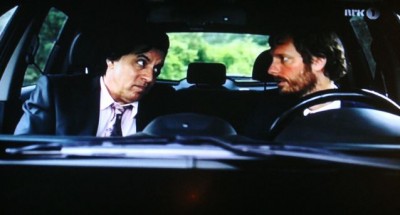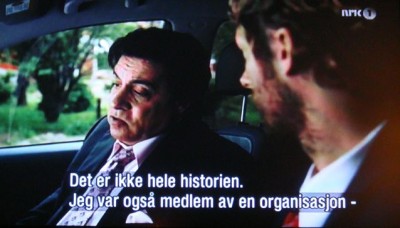Norway went on a sort of withdrawal Wednesday night. After months of hype and eight weeks of record ratings, the Norwegian TV series “Lilyhammer” wrapped up its first short season on state broadcaster NRK. Plans are underway for a second season, as soon as the show’s star gets leave from his main “Boss,” Bruce Springsteen.

Never before has a series on Norwegian Broadcasting (NRK) attracted such consistently high ratings as Lilyhammer did. Around a million Norwegians, fully one-fifth of the country’s entire population, tuned in week after week since the show’s belated premiere in late January, delayed by a flap over violation of Norway’s product placement laws.
Perhaps that just drummed up expectations for the series, billed as both a drama and comedy as it told the story of a tough-talking New York mafia boss who winds up in the small town of Lillehammer, Norway, as part of the US’ federal witness protection program. Lillehammer, often misprounced by foreigners as “Lily-hammer” instead of the more correct “Lill-uh-hahm-mair,” has long been known as the site of the popular Winter Olympics in 1994. Now it stands to be known as the site of constant cultural clashes between the local population and the newly arrived New Yorker Giovanni “Johnny” Henriksen, played by the American musician and actor Steven Van Zandt.
His near-constant presence on screen clearly was a big attraction in itself, given his stardom as “Little Steven” in Springsteen’s band and onscreen in the popular US television series The Sopranos. Van Zandt proved to be a big fan of Norway, where he’s spent a lot of time over the past two years, and he made Norwegians laugh at themselves as he portrayed on national TV the endless challenges facing foreigners in Norway.

Many foreigners living in Norway can likely relate to the cultural collisions highlighted on the show, and how Van Zandt’s character tackles them. Like when Van Zandt first runs into sheep freely grazing on the road, or the custom of making lengthy speeches at dinner parties, or even when he hops into a car ready to speed off somewhere, only to discover that the car has a standard stick-shift, not the automatic transmission so common in the US. Giovanni Henriksen clearly hasn’t used a clutch for years, if ever, with the result being a lurching trip down a country road and his passenger cringing all the way.
Or when Henriksen lands in a Norwegian jail cell, with its comfortable furnishings, color TV, private bathroom and program of social activities. “So where do I order the room service?” Henriksen sneers to the prison guard escorting him, as he settles into accommodation that seems anything but punishing. Henriksen also has a hard time accepting that his pregnant Norwegian girlfriend has been assigned a male midwife, or that Norwegians have a penchant for being “politically correct,” claiming to have “zero tolerance for violence” while Henriksen takes matters into his own hands whether that involves simply shooting a wolf that threatens his friends’ sheep or beating up taggers who deface private property. While the Norwegians stress dialogue and consensus, Henriksen just wants to get things done.
The series has been sold to broadcasters outside Norway, though, raising the question of whether viewers unfamiliar with Norway and Norwegian ways will grasp the humor or constant references that are highly local by nature. Overseas viewers may not understand the Norwegian fanaticism with training for the annual Birkebeiner ski race, for example, or the relevance of Grünerløkka (a trendy urban neighbourhood in Oslo) to the problems of a young couple trying to find happiness in Lillehammer.
Perhaps they will, given one US television critic’s description of the series as “a breath of fresh air” in an otherwise politically correct world. At the very least they’ll likely enjoy the scenes of hard-partying Norwegian high school graduates known as russ, and the celebrations of Norway’s Constitution Day on the 17th of May, when many Norwegians dress in colourful national costumes known as a bunad. Those scenes also gave Van Zandt’s conservative American character a chance to urge a young student preparing a traditional 17h of May speech to exhort the importance of Norwegian culture and warn against immigration — without even considering that he’s an immigrant in Norway himself.
Some Norwegian actors in the series have called Lilyhammer a parody of Norwegian life and everything from trolls to skiing to the welfare state. It’s all about Giovanni Henriksen’s attempts to fit into Norway’s highly regulated society, they note, as he plays the proverbial bull in a china shop. A buyer for BBC4 said she’d never seen anything like Lilyhammer, and she thinks it will appeal to British viewers, also calling it “fresh” and funny.
Rubicon, the Norwegian firm producing the show, seems sure that at least a second season will be produced, given interest from both NRK and overseas broadcasters. Filming, though, will have to wait until Van Zandt is available, because he’ll be off on a concert tour with Springsteen through much of this year.
Views and News from Norway/Nina Berglund
Please support our stories by clicking on the “Donate” button now:

